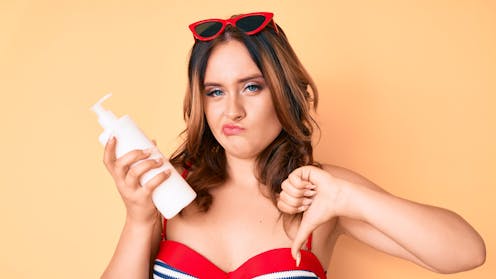sunscreen misinformation and its real‑world damage
- Written by Rachael Kent, Senior Lecturer in Digital Economy & Society Education, Department of Digital Humanities, King's College London

On a sunny afternoon, I was scrolling through social media when I came across a video of a young woman tossing her sunscreen into a bin. “I don’t trust this stuff anymore,” she said to the camera, holding the bottle up like a piece of damning evidence.
The clip had been viewed over half a million times, with commenters applauding her for “ditching chemicals” and recommending homemade alternatives like coconut oil and zinc powder.
In my research on the effect of digital technology on health, I’ve seen how posts like this can shape real-world behaviour. And anecdotally, dermatologists have reported[1] seeing more patients with severe sunburns or suspicious moles who say they stopped using sunscreen after watching similar videos.
Sunscreen misinformation created by social media influencers is spreading and this isn’t just a random trend. It’s being fuelled by the platforms designed to host influencer content.
References
- ^ have reported (www.cbsnews.com)
- ^ Sign up to our daily newsletter (theconversation.com)
- ^ The Digital Health Self (bristoluniversitypress.co.uk)
- ^ “unregulated public health platforms” (www.tandfonline.com)
- ^ Misinformation lends itself to social contagion – here's how to recognize and combat it (theconversation.com)
- ^ dramatically reduces risk (www.who.int)
- ^ women’s health are shadowbanned or suppressed (theconversation.com)
- ^ often believe they’re doing the right thing (www.tandfonline.com)
- ^ Sunscreen isn’t perfect (www.skincancer.org)
- ^ It needs to be reapplied properly (www.cancerresearchuk.org)
- ^ the evidence (pubmed.ncbi.nlm.nih.gov)
- ^ is clear and robust (www.health.harvard.edu)
- ^ Four ways you can design social media posts to combat health misinformation (theconversation.com)







